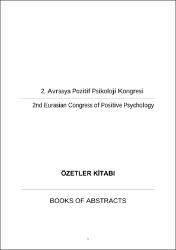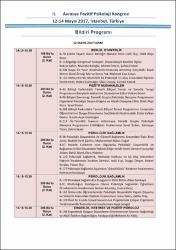Please use this identifier to cite or link to this item:
https://hdl.handle.net/20.500.11779/429| Title: | Increasing Mental Health Professionals’ Self-Esteem Through Mindfulness and Happiness |
| Authors: | Bulgan, Gökçe |
| Keywords: | Happiness Mental health professionals Mindfulness Self-esteem |
| Source: | Bulgan, G. (2017). Increasing mental health professionals' self-esteem through mindfulness and happiness. 2nd Eurasian Congress on Positive Psychology, May 12-14, İstanbul, Turkey. |
| Abstract: | Aim: The mental health field requires practitioners to be psychologically resourceful in orderto carry out their roles and responsibilities. Similarly, individuals’ self-esteem levels influencehow resourceful they view themselves to be. Therefore, increasing mental healthprofessionals’ self-esteem would positively influence their work with their clients. The aim ofthis study was to examine the role of mindfulness and happiness in predicting mental healthprofessionals’ self-esteem. Methods: Data were collected from 146 counselors and 154psychologists, a total of 300 mental health professionals. Two hundred and thirteen of theparticipants were female and 87 were male. Turkish versions of the Mindful AwarenessAttention Scale (Brown & Ryan, 2003; Özyeşil, Arslan, Kesici, & Deniz, 2011), theSubjective Happiness Scale (Doğan & Totan, 2013; Lyubomirsky & Lepper, 1999), and theTwo Dimensional Self-Esteem: Self-Liking and Self-Competence Scale (Doğan, 2011;Tafarodi & Swan, 2001) were used to collect the data. The study was correlational. Pearsoncorrelation coefficients and multiple regression analysis were used to analyze the data.Results: The results indicated that there were significant positive correlations between mentalhealth professionals’ mindfulness and self-esteem scores (r = .42; p <.01) and their happinessand selfesteem scores (r = .47; p <.01). Results of multiple regression analyses indicated thatmindfulness and happiness accounted for 31.5% of variance in mental health professionals’self-esteem scores. In addition, mindfulness (ß = .33, p <.001) and happiness (ß = .39, p<.001) both uniquely contributed to self-esteem. Discussion: Considering that mindfulnessand happiness had a significant unique contribution to self-esteem, teaching simple yeteffective mindfulness based interventions to mental health professionals and strategies toincrease their happiness levels could be useful in increasing their self-esteem. As mentalhealth professionals feel more satisfied about their esteem needs, they would be moreeffective in their work with their clients. |
| URI: | https://hdl.handle.net/20.500.11779/429 |
| Appears in Collections: | Rehberlik ve Psikolojik Danışmanlık Koleksiyonu |
Files in This Item:
| File | Description | Size | Format | |
|---|---|---|---|---|
| ppcongress-2017-kitapcik.pdf | Book of Abstracts | 3.09 MB | Adobe PDF |  View/Open |
| bildiri-programi.pdf | Bildiri Programı | 178.95 kB | Adobe PDF |  View/Open |
CORE Recommender
Sorry the service is unavailable at the moment. Please try again later.
Items in GCRIS Repository are protected by copyright, with all rights reserved, unless otherwise indicated.